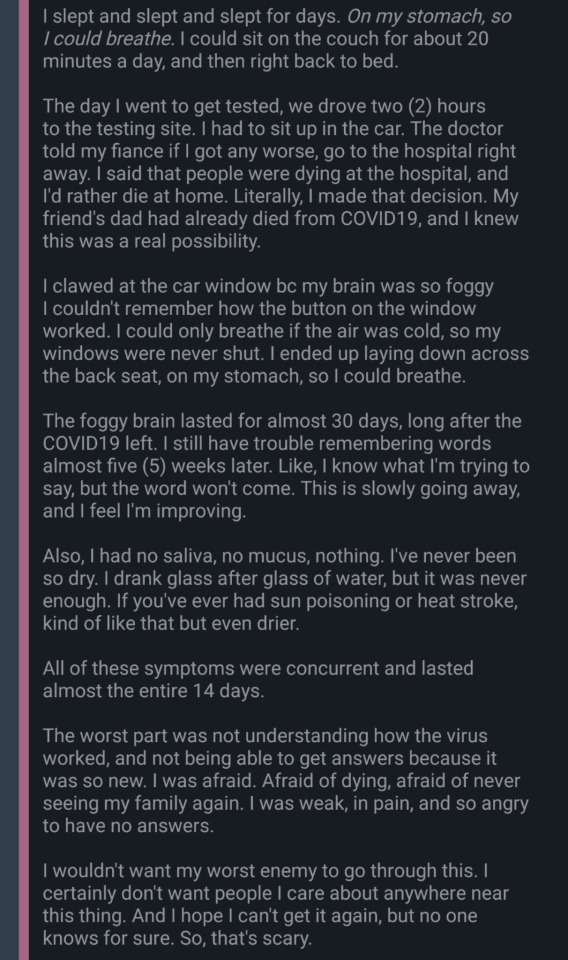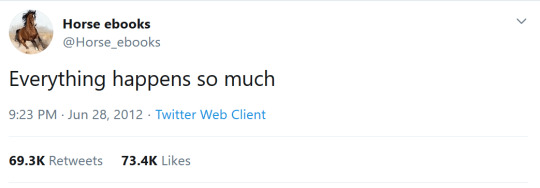Text






u/Cant_Even18 shares the horrific details of what it was like to have COVID.
Wear your masks. Wash your hands. Socially distance. And most importantly: stay the fuck home if you can.
57K notes
·
View notes
Text
cant conlang because i need a world and culture for vocab cant create a world and culture because i need them to be contextualized based on their environment cant contextualize based on environment because i dont have a map dont have a map because im too perfectionist to not detail billions of years of tectonic evolution and if its not 100% perfect geography i might as well never worldbuild again. therefore i only theoretically have hobbies
2K notes
·
View notes
Text

in the words of the great Elizabethan wordsmith William Shakespeare, in Hamlet Act IV Scene V, “When sorrows come, they come not single spies, but in battalions.” or, in the words of the great Twitter wordsmith @Horse_ebooks,

194K notes
·
View notes
Text
me constructing my own language: FUCK YOUR GENDERS! EVERYTHING IS NEUTRAL NOW!
264 notes
·
View notes
Text
Numbers - Tchen
In Nalaxen the least significant digit is said first, like in Arabic. So 327 literally translated would sound like "seven and twenty and three hundred"
One - kern
Two - xang
Three - tiin
Four - nyesh
Five - let
Six - rak
Seven - nemi
Eight - wim
Nine - akit
Ten - tishkern
Eleven - kern’tishkern
Twelve - xang’tishkern
Twenty - tishxang
One hundred - kelenkern
One hundred and one - kern’kelenkern
One hundred and ten - tishkern’kelenkern
One hundred and seventy three - tiin’tishnemi’kelenkern
One thousand - akwikern
Ten thousand - akwitishkern
Twelve thousand - akwixang’tishkern
One hundred thousand - akwikelenkern
One million - marlkern
One billion - amarkern
Fifteen thousand nine hundred and twenty six - rak’tishxang’kelenakit’akwilet’tishkern
Zero - ernek
2 notes
·
View notes
Text
The tone of Lord of the Rings changes significantly when you learn that Sauron isn’t his name but an elvish pun on it that basically means “that mother fucker”
31K notes
·
View notes
Text
Separated pronouns
We run into an issue where "the bear eats" and "they eat bear" have the same translation due to a lack of declensions: Dex di'imrifwin.
There are 2 ways around this. In formal speech, it is proper to always use the full name of the subject.
The lion eats bear - Nyera dex di'imrifwin.
In informal speech, separated pronouns are allowed to replace the subject.
I/me- tan
You - tim
They - ter
Us - tana
You (pl) - tima
They (pl) - tera
They eat bear - Ter dex di'imrifwin.
These pronouns cam also replace direct/indirect objects, as well as given possessive form.
The bear sees me - Dex tan diwar.
They see the bear on me - Ter dex ak tan diwar.
We see its food - Terat imri elawar.
If you do not need to use a separate pronoun to clarify the subject, then it technically should be omitted.
2 notes
·
View notes
Text
To feel - dyen/maxt
To feel (emotion, physical state) - dyen
I feel sad - Fast eldyen
("Fast elxal" for "I am sad" would be incorrect, implying that the speaker is the embodiment of sadness.)
I feel sick - lirtchana eldyen
To feel (tactile) - maxt
I feel water on my hand - Wen ak tanat dar elmaxt
1 note
·
View note
Text
If it wasn't clear already, there are no noun declensions, no articles, and adjectives/adverbs precede the modified noun/verb.
1 note
·
View note
Text
Sentence structure.
Nalaxen generally follows this sentence structure:
Subject - direct object - indirect object - verb
"Earth will sing love to the creatures." - "Kef win atsh nala diyixalix."
Possessive words are given the -at affix, and put before the affecting word much like adjectives.
"Singers will paint the earth with the colors of life." - "Yixalna kef min axenat inyeta dilameyetix."
1 note
·
View note
Text
Colors - inyeta
Red - dain
Orange - tiat
Yellow - neal
Green - axen
Blue - yerx
Violet - keatch
White - vien
Black - fanax
Light - tir
Dark - laka
Light red (pink) - tirdain
Dark green - laka'axen
0 notes
Text
Past tense verb vs. adjective
“I loved” vs. “I am loved.”
To love - win
I love - elwin
I loved - elwinen
to be - xal
I am loved - winrax elxal
#conlang#constructed language#fantasy#language#linguistics#i promise i'll put together all the grammar in one post some day once its all fleshed out
2 notes
·
View notes
Text
Imperative
command affix - etch-
"Sculpt from the mountain." - "Nyal angedin etchmeya."
1 note
·
View note
Text
This is a very thorough and thought out way of showcasing a language's uniqueness. Nalaxen is far too primordial for this at the moment, but once it's more formed I'd like to borrow this format if I may?
LORI / LORAE / ԼՈՐԻ
Lori is a conlang inspired by some of my favorite languages, which are Armenian, Finnish, Irish, Greenlandic, Spanish and Northern Sàmi. You’ll most likely see influences from these languages in Lori. It’s mostly an artistic conlang, but definitely has natural elements to it. Aesthetically, I wanted the conlang to look magical and a little witchy. I was oddly enough inspired by the Twilight Forest mod in Minecraft.
ALPHABET & PHONETICS

a /a/, b /b/, c /ʃ/, d /d/, e /e/, ph /f/, g /g/, h /h/ ae /i/, ch /k/, l /l/, m /m/, n /n/, ou /o/, p /p/, r /ɾ/, s /s/, t /t/, o /ɔ/
(I’m not an expert with the IPA symbols, so I hope these are correct)
Lori can be written with both Latin letters and Armenian letters. I decided to do the Armenian letters as a way of trying to get myself more used to them since I’m trying to learn Armenian. All letters have the same phoneme as in Armenian, apart from վ (in Lori it’s /f/, in Armenian it’s /v/) and թ (in Lori it’s /t/, in Armenian it’s /tʰ/).
NOUNS & ADJECTIVES
Nouns in Lori are declensed into number and optional definiteness in addition to 12 cases and 7 color moods. There are several declension systems, and which one to follow is decided by the ending of the noun. In this post I’ll keep it simple and showcase the most basic and most common declension, which you use with almost all nouns ending on a consonant.
DEFINITENESS
(ae) tom / a moon
tom / the moon
tomr / moons
(e) tomr / the moons
CASES
nominative / tom - moon
accusative / tomout - moon (as object of a sentence)
dative / tome - moon (as indirect object of a sentence)
genitive / tomae - moon’s
locative / tomac - on/in moon
ablative / tomaàe - from moon
lative / tomea - to moon
komitative-instrumentative / tomach - with moon
abessive / tomat - without moon
translative / tomaph - into (the state of) moon
essive / toma - as moon
temporal / tomoum - when moon
nominative / tomr - moons
accusative / tomoutr - moons (as object of a sentence)
dative / tomre - moons (as indirect object of a sentence)
genitive / tomrae - moons’
locative / tomrac - on/in moons
ablative / tomraàe - from moons
lative / tomrea - to moons
komitative-instrumentative / tomrach - with moons
abessive / tomrat - without moons
translative / tomraph - into (the state of) moons
essive / tomra - as moons
temporal / tomroum - when moons
ADJECTIVES
Adjectives are declensed into the same case as the noun they describe, just as in Finnish ;D
echreou tom - big moon
echrac tomac - on big moon
echrate tomrat - without big moons
COLOR MOODS
(still w.i.p.)
All nouns in Lori can be declensed into 7 color moods. These colors give the nouns a certain personal quality:
pocha - dog
red - you dislike this (pocha -> pochora) + r, or, chr
orange - you crave this (pocha -> pochta) + t, et
yellow - you fear this (pocha -> pochsa) + s
green - you are pleased with this (pocha -> pochno) + n, no
blue - you are waiting for this (pocha -> pochnaea) + nae
indigo - you feel for this (pocha -> poucheg) + ou, oug, eg, g
violet - you love this (pocha -> pochollaea) + ll, oll, ollae
How nouns are declensed into these is quite irregular, but in most cases the extra letters are added before the last vowel. Which letters, if there are more options, is free of choice. I think this adds an interesting personal level of expression to Lori, which is why I decided to add it in.
VERBS & ADVERBS
Verbs in Lori are conjugated in person, number, tense and mood. All infinitives end on -ae.
abrae - to speak, talk
ollae - to love
camnae - to sleep
máegnae - to understand
aoutae - to see
As verbs are conjugated in person, pronouns are not needed with them.
amaet - I
ta - you
na & nou - it & he/she
sachou - we
tachou - you (all)
ea & eou - they & they (plural it)
When conjugating the verbs, the infinitive ending (-ae) is replaced with a tense/mood/person ending.
present tense endings: -em, -et, -e, -elem, -eae, -es
simple past tense endings: -aem, -aet, -ae, -aelaem, -aeh, -aes
“just now” past tense endings: -ouchaem, -ouchaet, -ouchae, -ouchaelem, -ouche, -ouchaes
“a while ago” past tense endings: -ouhaem, -ouhaet, -ouhae, -ouhaelem, -ouhe, -ouhaes
potential past tense endings: -aeam, -aeat, -aea, -aealem, -eaet, -aeas
future tense endings: -am, -at, -a, -alam, -aé, -as
conditional mood endings: -om, -ot, -o, -aelom, -oae, -os
I sleep. / Camnem. / Շամնեմ։
She sees. / Aoutae. / Աութի։
We spoke. / Abraelaem. / Աբրիլիմ։
They just saw. / Aoutouchaes. / Աութուկիս։
You loved once. / Ollaeouhaet. / Ոլլիուհիթ։ (irregular, keeps it’s infinitive mark)
I might understood. / Màegnaeam. / Մաեգնիամ։
You (all) will sleep. / Camnalam. / Շամնալամ։
He would speak. / Abro. / Աբրո։
Lori has two imperatives:
abread - speak (polite, kind of like a request)
abraech - speak! (command)
In Lori, you can place “which” sentences before the noun they are about, functioning as adjectives.
Abraen pocha camne taeèlac.
The dog, which spoke, is sleeping on the floor.
“Abraen” translates as “which spoke”. These can be conjugated into all the tenses and moods. The endings are:
-en (present), -aen (simple past), -achaen (”just now” past), -ahaen (”while ago” past), -aean (potential past), -an (future), -on (conditional)
Adverbs from adjectives are usually formed by either putting an en- affix on the adjectives, or a -st suffix.
talla - quick
entalla / tallast - quickly
However, there are several adverbs that don’t follow this.
peaecaegae - well (poae - good)
aàech - loudly (troub - loud)
mouschan - beautifully (moscharae - beautiful)
None of the adverbs not formed from adjectives follow these rules, for example “maerchetounaechaes” (right now).
EXAMPLES AND SUCH
USEFUL PHRASES
Hey! / Aouae! Aoulen! Obasaech!
Welcome! / Aoubranogae!
Thank you! / Techastoumar! Techae!
Thank you so much! / Charm techastoumare! Charm techae!
My name is … / Nonnem …
I am … years old. / Agnourem …
I am from … / …-aáe anem.
How are you? / On naemech?
I’m good. / Assem.
I’m not good. / Taegem.
Good bye! / Mallan!
We’ll see eachother soon! / Tataeollan!
What is it? / Phant an?
What is this? / Phant chat an?
What is that? / Phant choun an?
It is … / … an.
This is … / Chat … an.
That is … / Choun … an.
There are … / … are.
I don’t speak Lori. / Ch’abrem loraet.
I don’t know. / Chour.
I don’t understand. / Cháegnem.
Could you (please) help me? / Ognochnet anou (dae)?
NUMBERS 1 TO 10
1 - aecha
2 - chas
3 - chare
4 - naed
5 - nach
6 - aecae
7 - caemst
8 - amst
9 - maech
10 - aechno
COLORS
coustou - red
tenot - orange
chesae - yellow
phoaet - greem
namel - blue
ougel - indigo
manouco - violet
aoual - white
tona - black
omag - gray
trapho - brown
aeda - light
natan - dark
aednamel - light blue
natacoustou - dark red
EXAMPLE TEXT
Nos natan an, aegn aeda an. Chour naemaenou t’sabaeérem, sachoum donnaaé pacar o toucar as. Aegn taebadrache aou nos alaeéd an. Aegnoum achbem, nosoum camnem boul macoucmaen. Esous aeannase aou tom aeane. Aed gnarane aou natanaeél ae abnaeéchen seleour an. Choraeod oullrat an.
Նոս նաթան ան, իգն իդա ան։ Կուր նիմինու թ՛սաբիերեմ, սակում դոննաի պաշար ո թուշար աս։ Իգն թիբադրակե աու նոս ալիեդ ան։ Իգնում ակբեմ, նոսում շամնեմ բուլ մաշուշմին։ Եսուս իաննասե աու թոմ իանե։ Իդ գնարանե աու նաթանիել ի աբնիեկեն սելեուր ան։ Կորիոդ ուլլրաթ ան։
The night is dark, the day is light. I don’t know which I prefer, because both has good sides and bad sides. At day a lot is happening while at night it’s quiet. At day I’m awake, at night I sleep comfortably in my bed. The sun grins while the moon smiles. The light shows the way while the darkness is a protecting cape. Choosing is impossible.
nos - night
natan - dark
an - pres. 3. person sing. of “anae” (to be)
aegn - day
aeda - light
chour - I don’t know
naemaenou - which; what
t’ - that
sabaeérem - pres 1. person sing. of “sabaeérae” (to prefer)
sachoum - because
donnaáe - genitive sing. of “donna” (both things)
pacar - good quality, pro
o - and
toucar - bad quality, con
as - pres. 3. person plur. of “anae” (to be)
taebadrache - pres. 3. person sing. of “taebadrachae” (to have a lot happen when)
aou - while; eye
alaeéd - quiet; calm
aegnoum - temporal sing. of “aegn” (day)
achbem - pres. 1. person sing. of “achbae” (to be awake)
nosoum - temporal sing. of “nos” (night)
camnem - pres. 1. person sing. of “camnae” (to sleep)
boul - comfortably
macoucmaen - locative sing. of “macou” (bed) + “-maen” (my)
esous - sun
aeannase - pres. 3. person sing. of “aeannasae” (to smile with teeth; to grin)
tom - moon
aeane - pres. 3. person sing. of “aeanae” (to smile)
aed - light
gnarane - pres. 3. person sing. of “gnaranae” (to show the way)
natanaeél - darkness
ae - indefinite marker
abnaeéchen - “which”-form of “abnaeéchae” (to protect)
seleour - cape
choraeod - choosing, deciding
oullrat - abessive plur. of “oull” (possibility)
_________
I sadly can’t show absolutely everything about Lori as this post would be really long then, but this should show the main features. If you have any questions about Lori, feel free to ask! I’ll make a post for my second conlang, Ayde, soon!
22 notes
·
View notes


